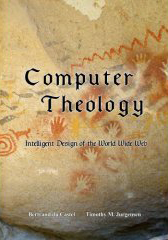PRESS
COMPUTER THEOLOGY |
||||
|
is mundane, for example, what time to set the
alarm clock to ring. Some of it is moderately complex, such as remembering all
the details emanating from the early flight on Thursday. In the extreme, it
transcends banality and portends rationale bordering on the sublime. Consider,
for example, our personal involvement with the law. Among our earliest
childhood admonitions is this, “Ignorance of the law is no excuse.” This edict
offers a lot of surface area where policy rubs against us, across the full
range of the sensori-motor experience. Moreover, this area is increasing at an
accelerating rate. As a consequence, lest we be totally overwhelmed, we seek
more and better support in dealing with it. We currently call it lots of
things; personal profiles, individual preferences or perhaps rules of
engagement. We find it subject to withering cross-currents of conflicting
context, influenced by concerns for personal security and bounded by various
rights of privacy. It finally culminates in the uneasy framework of social
compacts. It seems clear to us that the need for an emergent computer theology
is grounded in the ambiguities of this technology-enhanced social
infrastructure. We suggest that
the evolution of individual computers has tended to match the early evolution
of people and their societal interactions. We anticipate a variety of opportunities
for future evolutionary pathways in which truly private, portable trusted
computers parallel the evolution of more complex human social systems. The book is not a rigorous book as it pertains to religious doctrine and mechanisms, nor is it an exhaustive study of evolutionary mechanisms. However, the book is significantly grounded in the literature of both fields. The book is a moderately thorough review of computer evolution and is rather detailed in its treatment of the emergence and development of trusted computer technology and its interaction with the World Wide Web. We find quite striking the parallels between the way people react, both individually and within groups, to personal and societal challenges, and the way computers, obviously as developed by people, behave in the increasingly complex and interconnected world wrought by modern technology. We feel these parallels to be an interesting culmination of this writing. Of course, it leaves us wondering: in regards to technology, are the new species of trusted computers destined to be among the lower primates or are they the direct precursors of Homo sapiens sapiens, the sub-species designation that we also know as modern man? In regards to religious orders, are they precursors of computer ecosystems, or their very constitution?
|
||||
|
||||
© Midori Press, LLC, 2008. All rights reserved for all countries. (Inquiries) The contents of ComputerTheology: Intelligent Design of the World Wide Web are presented for the sole purpose of on-line reading to allow the reader to determine whether to purchase the book. Reproduction and other derivative works are expressly forbidden without the written consent of Midori Press. Legal deposit with the US Library of Congress 1-33735636, 2007.
|
ComputerTheology Intelligent Design of the World Wide Web Bertrand du Castel and Timothy M. Jurgensen Midori Press, Austin Texas 1st Edition 2008 (468 pp) ISBN 0-9801821-1-5 |
Book available at Midori Press (regular) |
